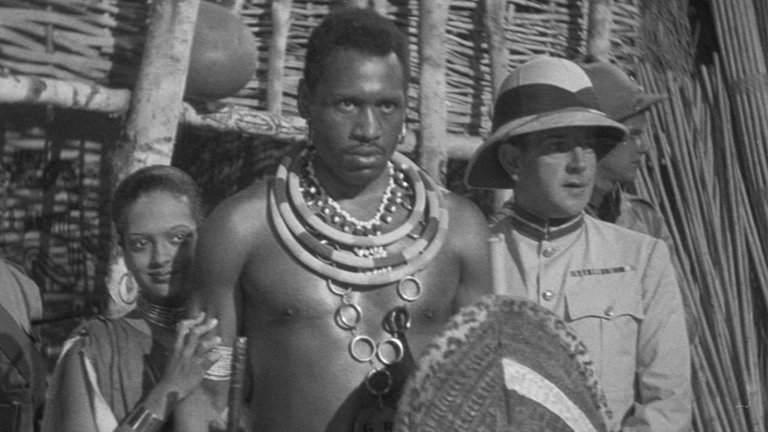Film Review: Sanders of the River (1935)

In the present day, the notions of globalisation and multiculturalism appear to be fading in the West, replaced by an increased rhetoric of the world being divided into a "garden" and a "jungle," with the implicit understanding that the former should rule over the latter. However, in the first half of the 20th century, such views were not only explicit but also widespread, finding their way into the content of films. One such notable, and from today's "politically correct" perspective, problematic film is the British adventure drama Sanders of the River, released in 1935.
Sanders of the River was based on a 1911 novel by the immensely prolific British writer Edgar Wallace, whose literary works frequently found their way to the silver screen, with his script for King Kong being his most well-known contribution. The film follows the story of the titular protagonist, Sanders (played by Leslie Banks), a British colonial official tasked with maintaining order and bringing the benefits of civilisation to the native population in a remote territory in Nigeria. His policies brought peace and prosperity and earned him huge respect among tribal chiefs, including Bosambo (played by Paul Robeson), who becomes his most trusted and valuable ally. When Sanders temporarily leaves his office, various unsavoury characters try to use it to their advantage, leading to chaos and violence, while Bosambo tries his best to preserve Sanders’ life work.
The film was produced by London Films, a production company founded by the Hungarian immigrant to Britain, Alexander Korda, who wholeheartedly embraced his new home and was determined to showcase the British Empire as the greatest achievement since the invention of sliced bread. The opening titles of the film express the filmmakers' admiration for the handful of British civil servants who tirelessly work to bring the benefits of civilisation and good government to millions of native subjects in the colonies.
However, the intended message of the film was not entirely achieved, either by accident or by the sabotage of Zoltan Korda, the director, who was an outspoken left-wing socialist and did not share his brother's enthusiasm for British imperialism. While the titular protagonist, Sanders, is competently played by Leslie Banks, he is effectively relegated to a supporting character, and his absence actually drives much of the plot.
The real protagonist of the film is Bosambo, played by the larger-than-life African American singer, actor, and political activist Paul Robeson. In Robeson's interpretation, Bosambo becomes a cunning and resourceful man, a brave leader of his people, a suave seducer of women, and a loving father and loyal friend of Sanders, who has all the reasons to treat him as an equal. Robeson also takes the opportunity to showcase his famous baritone through a number of musical numbers, and he is paired with the African American actress and singer Nina Mae McKinney, who plays Bosambo's wife, Lilongo, and has a likable musical number of her own.
Despite carrying the film on his broad shoulders and contributing to its success among the public and critics, Robeson later distanced himself from the film, expressing his displeasure with the way Africans, including his character, were portrayed in a paternalistic way, and claiming that the post-production editing made the film quite different from what he had actually made. While some of Robeson's criticism is valid, it would be unfair to reduce Sanders of the River to a simplistic apology for British imperialism. The script explicitly places the blame for the bad things that happen on opportunistic white characters who sell banned gin and rifles to the natives, rather than on the natives themselves. Furthermore, the film's technical advisor was Sir Bernard Henry Bourdillon, a British governor of Nigeria who had rather progressive views for his generation and was known for his advocacy of native self-government.
From a technical standpoint, Sanders of the River is not particularly impressive, as it follows the pattern of Tarzan films in Hollywood, with most of the film being shot in studios and the rest being documentary footage shot by a crew that went to Africa for four months. However, some of this material may have great ethnographic value, and one of the scenes, featuring a tribal chief, features an uncredited appearance by Jommo Kenyatta, the future prime minister and president of Kenya.
Today, more than half a century since the end of the British Empire, Sanders of the River looks dated, both technically and in terms of its political message. However, it can still be appreciated as a curiosity by cinephiles. Alexander Korda used the success of Sanders of the River to make two even more spectacular films with somewhat similar subjects – The Drum and Four Feathers – that, together with "Sanders of the River," are often referenced as his "Empire Trilogy." Wallace’s novel was adapted again in 1963 as Drums Along the River, a film starring Richard Todd as Sanders, a role repeated in its 1964 sequel Coast of Skeletons.
RATING: 5/10 (++)
Blog in Croatian https://draxblog.com
Blog in English https://draxreview.wordpress.com/
InLeo blog https://inleo.io/@drax.leo
Hiveonboard: https://hiveonboard.com?ref=drax
Rising Star game: https://www.risingstargame.com?referrer=drax
1Inch: https://1inch.exchange/#/r/0x83823d8CCB74F828148258BB4457642124b1328e
BTC donations: 1EWxiMiP6iiG9rger3NuUSd6HByaxQWafG
ETH donations: 0xB305F144323b99e6f8b1d66f5D7DE78B498C32A7
BCH donations: qpvxw0jax79lhmvlgcldkzpqanf03r9cjv8y6gtmk9
Posted Using InLeo Alpha
